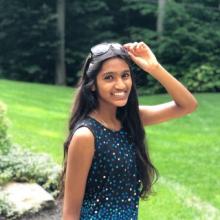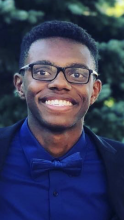Sparking a young person’s interest in science is exciting, though it takes creativity and adaptability. That statement was most true in 2020, when the Cancer Center’s summer training program directors were forced to change course during the COVID-19 pandemic. Teamwork, dedication and creativity paid off. The center hosted two successful programs, one that will live on as a spin-off.
Cancer-focused Summer Undergraduate Research (CanSUR)
Undergraduates from across the country competed for just 32 slots in the 2020 CanSUR program. When the in-person program was canceled, many students were disappointed they would miss their chance to participate in a summer research project – a crucial step on the path to graduate school. “Summer programs are critical for students to progress in their career paths. If these programs were canceled, opportunities would be lost,” says Mark W. Jackson, PhD, Associate Director for Training and Education.
To bridge the gap, a virtual summer program was hosted for 11 students selected from the top tier of CanSUR applicants. The virtual program provided instruction in large data set analysis and methodology for experimentation, led by Amar Desai, PhD, and Julianne Smith, PhD. Desai credits the researchers and mentors for making this virtual program exciting by speaking openly at the students’ level. “They didn’t just talk about high-level science,” says Desai. “They shared concepts, insecurities, career paths. They were excited to teach the students and partner with them.”
DataCamp offered the program a free education license, enabling students to learn basic programming language and application to big data sets, a component Desai would like to see integrated into more undergraduate programs. “Many industries are evolving with advances in technology, and a prerequisite is often the ability to work with large data sets. We need to appreciate the future of science will be heavily reliant on informatics/big data.”
Shwetha Ramachandran, an undergraduate student on a premedical track, applied to the CanSUR program to meld her fascination with the immune system and cancer research. She said the focus on mentoring was an essential part of the program. “The program placed an emphasis on finding an exceptional mentor who guides us in the right direction and helps us learn from mistakes we’ve made and find beneficial opportunities,” she says. After graduation, Ramachandran will put her medical school plans on hold for a year to return to the lab of her mentor, Vijay Krishna, PhD. “I will gain more experience in the lab and finish a project. I also want to get more clinical experience and understand how COVID has changed patient care.”
Feedback on the new program was so positive it is continuing in 2021, led by Desai. Nothing can replace in-person training, says Desai, but this past year showed virtual models can succeed. He would like to see virtual programs expand to reach communities with barriers such as GPA criteria, financial or lack of access to in-person training. “It will distinguish CWRU to provide world-class training by world-class scientists. If organized right, we can relieve the burden on faculty and open up to more students."
Youth Engaged in Science – Cleveland-area Middle and High School Students
Cleveland-area middle and high school students are introduced to cancer research through the Youth Engaged in Science (YES) program, funded by the National Cancer Institute (NCI). Due to COVID-19 restrictions, it appeared the 2020 YES program would not happen. It took a lot of creative thinking, but in less than two weeks Nathan A. Berger, MD, YES program director, entirely reworked the program and gained NCI’s approval, then set plans into action.
YES, which supports cancer-focused educational opportunities for underrepresented minority students, along with their teachers and families, strives to engage students early on, spark their interest in cancer research, and give them the tools to join the biomedical workforce.
“We only have one chance to get students interested in science,” says Berger. “If we missed this chance, we may never get another. These kids were stuck inside getting cabin fever. We had to do something.”
Berger says the program focused on purposeful modules of engagement and interaction, to keep students focused and invested in the virtual environment. Students were paired with mentors, tackling a research question together. The experience culminated in the preparation of a research paper, abstract and final presentation. Lunch and learns with faculty members featured open, honest discussions about career options, college experiences and professional education. Students analyzed current events from a scientific approach, offering a fresh way to talk about important yet sensitive topics. Small group writing and presentation workshops guided students on reading, writing and organizing scientific papers.
Solon High School senior Eric Nouafo was mentored by neurosurgeon and physician-scientist Andrew Sloan, MD. Nouafo says he found the journal readings valuable, working closely with Sloan to comprehend the science behind the article and understand the lab’s research. Nouafo says YES is “a great way to get your feet wet with science and research. It gave me a sense of what I like and don’t like, and an opportunity to learn a lot.”
“I continue to be impressed by the high-caliber level of research projects these students produced, especially in such a short period of time. They gave this program their all,” says Berger. “Student commitment and drive combined with the dedicated mentors and faculty at the School of Medicine proved to be a winning combination – no matter the program format."
This story was featured in our 2020 Annual Report. Click here to read the full report.



